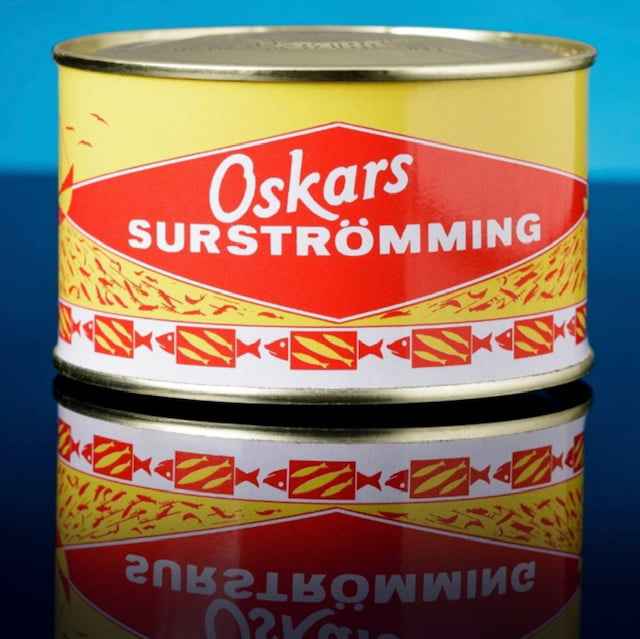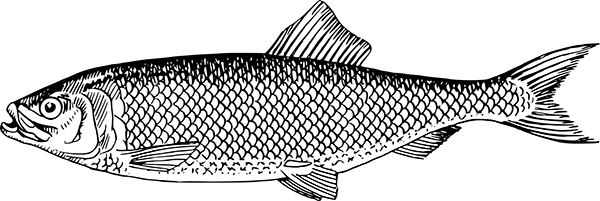On the Swedish herring delicacy which defies delicacy, insisting upon schnapps and communal singing in the face of its intimations of mortality
SURSTRÖMMING

Surströmming is fermented Baltic herring – strömming is the word for the smaller Baltic herring; sur means sour. A Swedish delicacy from the Gulf of Bothnia, it’s salted enough to discourage dangerous bacteria and the decomposition of the protein, but not enough to prevent fermentation and the good bacteria, which make it sour.
An Outdoor Food
Once, presumably, the whole process was done in the barrel, but these days it is started off in barrels and then tinned. Fermentation continues in the can, which swells visibly as the noxious gases expand. Hydrogen sulphide, which carries the smell associated with rotten eggs, is joined by propionic and butyric acid, both of which have their own strongly anti-social perfumes.
By tradition and necessity, the cans are opened outside and under water, allowing the gases to escape without spraying the consumer’s face or clothing. It is common for the whole meal to be eaten outside.
Taken into the kitchen, it has the capacity to penetrate every room of a reasonable-sized house with sulphurous intimations of mortality. It does vary in strength, some brands packing a more powerful punch than others.
Aficionados sometimes like to wait for the swelling cans to approach the spherical, before pronouncing it ready, although this brings the risk of liquification.
Eating Surströmming
Having opened the can, it’s possible to reduce the smell and the strength by washing the fish, but this is frowned upon. In their moderately advanced stage of decomposition, filleting the herrings is relatively easy, but you can also buy it ready filleted.
The fillets are eaten on or in a sandwich of buttered Swedish flatbread (tunnbröd) with slices of raw onion and boiled potato. It is washed down with ice cold schnapps or aquavit. There is an element of celebratory ritual in eating it and good-humoured drinking songs can supply the finishing touch to the perfect event.
Origins
In North Atlantic Seafood (1979), Alan Davidson recounts a suspiciously precise origin story given to him by Dr Alander of Göteborg, who had been told it by a fishery inspector in the Gulf of Bothnia.
It seems that in the sixteenth century, the inhabitants of Gävle on the Bothnian coast were wont to sail forth every spring in search of Herring, which they would salt at sea. Their vessel, the Haxe, accommodated wives and children as well as goats, empty barrels and a store of salt. Having fished all summer, they would come back and sell their catch at Älvekarleby.
One year they caught more herring than they had salt for: so some of the herring began to ferment and could not be sold to their regular customers. Luckily they found some guileless forest people, of Finnish stock, to whom they were able to sell the faulty produce, confident that they would never see them again. Next year, of course, they took ample salt with them and came back with the perfect produce. However the forest men were waiting for them, and demanded ‘the same as last year’.
Traditional Swedish attitudes to the Finns are not entirely dissimilar to those which inform English jokes about the Irish.
Fermenting Fish
Preservative fish fermentation has a long history and the process is still widely used in the Far East. The Norwegians ferment trout to produce the slightly milder rakørret. Liquamen and garum the fermented fish sauces of the Romans, must have come with a broadly similar smell.
There are no rock salt deposits in Sweden and salt cannot easily be produced from the low saline waters of the Baltic, which become progressively less saline in the Gulf of Bothnia. Even where salt was easier to acquire, barrels of herring were frequently sold in dubious states. The C16th was generally more tolerant of extreme smells.
Opening the Barrels
The barrels are traditionally opened each year around the 21st August. Another fishery official told Davidson of the time when, as a young man on the island of Ulvön, he witnessed 200 barrels being opened. Birds began to drop dead out of the sky and all tugmasters in the surrounding seas immediately changed course for Ulvön harbour.
